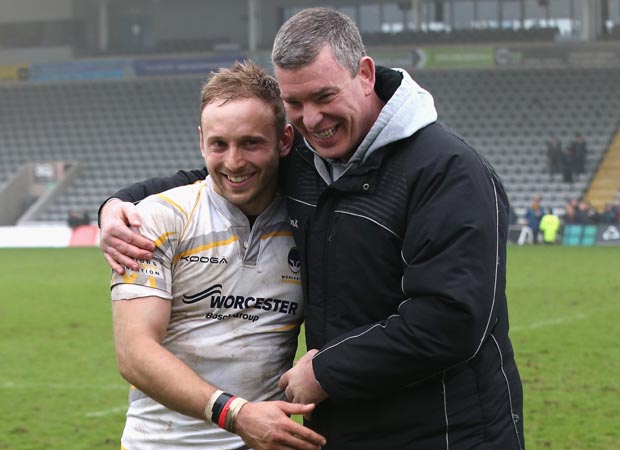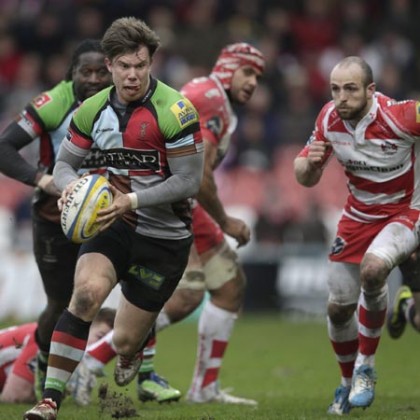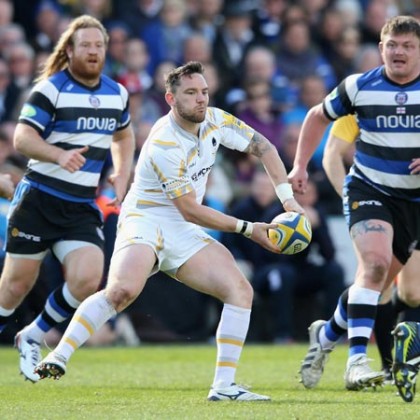 Do you still feel a lingering sense of frustration that Worcester went down last season?
Do you still feel a lingering sense of frustration that Worcester went down last season?
There’s frustration that we couldn’t influence things earlier. We were caught with the dilemma of identifying a group of players to travel with us, whilst at the same time risking ostracising another part of the group. We had to try and evolve over the first three or four months of the season and that was the time we missed out in crucial fixtures, losing at home to Newcastle and London Irish. After Christmas we were quite a competitive side. None of us wanted the eventual outcome but I didn’t quite know the answer that would have alleviated the situation earlier.
Was relegation a dent to your personal pride?
It’s a dent for anybody involved in the club. But you’ve also got to understand the risks when taking on a job and make sure you make the right decisions irrespective of the pressures associated with those risks. This club had succumbed to simply surviving for a long time and strategically needed to change. We weren’t prepared to compromise on what we believed would in future be right for the club. I’m confident in the people who now work for me, confident in the people we’ve been able to bring in, but last season we weren’t quite able to travel quickly enough.
Summer turnover has seen 18 new players arrive, with a similar number out – what challenges does that present?
There are two things here. Firstly, it needed to happen, the club had to go back to a situation where individuals could come here and grow. They’d become very static by the nature of recruiting to survive and it wasn’t an accident that the club had no one in England age-group sides or the EPS. We were basically loaded with a significant wage bill with people that were tailing at the end of their careers – and that’s happened at Worcester for six or seven years. So turnover had to happen and we needed individuals that we felt could grow, wanted to grow and wanted this club to be successful so they could determine their own futures. Secondly, when you’ve got that and everybody’s got a shared objective, we’ve actually come together quite quickly. It doesn’t mean the cohesion around playing isn’t going to take time, but the Championship is not the Premiership and it doesn’t all have to work on days one, two or three. We’ve got time to grow over the next six to nine months, but we’re starting from a position where everybody has the same objectives about making this place successful and themselves within it.

Your recruitment contains an eclectic mix – what sort of characters were you looking for?
We haven’t recruited randomly, we’ve been very specific. We knew we needed some key people in the middle with miles on the clock that we value, so guys like GJ van Velze (ex-Northampton) and Andries Pretorius (Cardiff Blues) will join the likes of Jonathan Thomas, Alex Grove and Chris Pennell in that set of names in the middle of the business and I’m delighted they see the challenge the same way we do. Then we also specifically targeted talent that we felt was trapped at other clubs, so to get Ryan Mills (Gloucester), Sam Smith (Harlequins) and Niall Annett (Ulster) was great. They’re all guys who are good enough to play but just got restricted at another club.
Would former Bath wing Tom Biggs fall into that ‘trapped’ category?
Signing Tom Biggs was a bit of good fortune for us at just the right time. He’s the same and he’s been frustrated that nobody ever valued him moving up and getting international recognition, and then he ended up in a bit of a dead end at Bath. For him to come here now offers him the same challenge as everyone else and I’m pleased he gets what we’re trying to do.
You talk a lot about growth and development – can you define your strategy a bit more?
Yes. Let’s stop thinking Worcester trade in a market where the best players want to come to us because the reality is that unless we distort the market with money, they don’t. We’re coming away from that because it just puts you in the 33-year-old player bracket with a year to live with us and then are struggling to move again. When you look at the big clubs I understand the challenge of needing to compete at the top of the Premiership and Europe – I had it for seven years at Gloucester – but it does trap people underneath who are well capable of playing in the Premiership. For example, when Marland Yarde was rumoured for Quins it was very clear Sam Smith was going to be frustrated, so we were very quick to move and say we could provide him with an opportunity. We know this is one area we can sell, so let’s stop trying to sell Worcester in some sort of pretence of what it might be, let’s actually sell it as a clear place guys can be first choice if their form’s where it needs to be. I had the same conversation with Ryan Mills, who was frustrated at being blocked at Gloucester.
You’ve renewed acquaintances with fly-half Ryan Lamb after some well-publicised differences in the past at Gloucester – how’s that going to work?
I worked with Ryan from when he was 17 and he’s a different person now. He brings a lot of experience and a lot of ambition which gave us a lot of confidence towards the end of last season. There are not many Premiership tens jumping around who have played for Leicester, Northampton and Gloucester and who were prepared to come and take this opportunity. My relationship with Ryan has actually always been a very good one, otherwise he would never have seen coming here as an option. But what happens sometimes is when things are going in wrong directions from an individual or club, the director of rugby has to take decisions and people have to part. That’s what happened with Ryan when he went to London Irish, but the manner in which you part can allow you to work with people again in future and that’s what’s happened.

Even so, having Ryan on board must come with an element of risk?
There have been incidences with Ryan where we’ve disagreed but I’d say he’s one of the most enjoyable people I’ve ever coached. He can be one of the most frustrating but that’s part of the package and I think he enjoys working with me. He’s 28 now and he’s been a breath of fresh air for all of us. He has to change, he knows that and this is a different place – he needs to adapt and influence people in a different way. But as long as he’s prepared to do that, I’ll love to coach him again.
Promotion is the obvious goal, but what else are you looking to get out of the coming season?
We’ve got a real opportunity to start from scratch. No club gets that opportunity when you’re in the Premiership. We’ve had an opportunity to build a group of people who are desperate for the challenge, but suddenly it’s starting to work and we were in a pretty good space at the end of last season, which was pretty obvious when we beat Gloucester. People thought we would be pulling lumps out of each other and falling apart, but by the end we had pretty good people on board with the likes of James Percival, Grove and Pennell and now we’ve added more to that we’ll become a much tighter team. We can’t hide, we’ve got a lot of work to do and I’m not pretending we’ve got a team that’s going to launch itself, but we’ve got some great guys to start with.
Did your heart sink when Bristol failed to go up?
Not really. I understand why you’re asking but we’ve got different approaches and I can’t build this whole business around one other club, one game or anything else. If we’re going to be successful – and Bristol will say the same – it doesn’t really matter who you play, this is about setting the foundations to be a successful Premiership side. The stepping stone for that is to win the play-offs but I’m sure the rest of the Championship is looking to cause both ourselves and Bristol to slip over. Leeds and everyone else will have their say but we’ve got to build something that is going to be sustainable and has to be able to get into the Premiership and then compete in the Premiership – and not do that with a July shopping spree of 25 players, because the reality of bringing in 25 players in July is that they’re not wanted by others.
You’ll not be looking to follow London Welsh’s intense summer recruitment policy in the event of winning promotion then?
Exactly! You look at the one successful team going up from the Championship in recent years and it’s Exeter. The team they’ve got now doesn’t look particularly similar to the team that went up but the consistency in their first, second and third years was high. If we are successful, I wouldn’t see us signing 25 players because I don’t think we would be successful without people putting their hands up and growing. We still need quality and we need to enhance this group if we’re not going to be bumping around the bottom two or three of the Premiership, but the majority of people, if we get this right, are going to come from within this group.
Were your three years out of coaching after leaving Gloucester in 2009 beneficial?
Every experience changes you and I loved the two years I had at Sky Sports. It was important that I got away. I wasn’t particularly in love with the game when I left Gloucester because of how certain people behaved at that time and if I’d rolled into another job I might have carried that baggage with me, so to create a gap was good. Working for Sky was probably the best two years of my life in terms of giving me a different dimension. I’d been involved in rugby since I was 16 so it was refreshing to do it in a different way and it made it difficult to choose to come back. It’s only the unique challenge at Worcester that persuaded me, I don’t think I’d have done this anywhere else. It wasn’t like I did a bit with Scotland and got the bug again, it was purely the chance to run a strategic plan and see if you can make this club successful and sustainable in the coming years.

Did your time with Sky give you a different perspective on the rugby media?
It actually confirmed a few things. There are a lot of people who work very hard in the media and are therefore entitled to their opinions. But there are some people who skim over the surface and that frustrates the elite end of the game because that media still educates the majority. I’ve always felt frustrated by people who have an opinion but don’t work particularly hard to do that.
You’re referred to as the ‘Big, bad wolf’ in certain quarters – do you still have a volcanic side?
(Laughs) I think that grew from years ago. Northampton never liked me and Garath Archer and I became pantomime villains in the eyes of their supporters. I’ve still got passion and you should never lose that because otherwise this job can become a real grind. Towards the tail end at Gloucester it became a grind and I was frustrated by the way some of the senior management of that company conducted themselves. You realised then that this isn’t a particularly glamorous job, so I’ve still got that passion and I can get frustrated when people don’t share that passion. But I’m getting a bit older and more mellow now so I let other people do the shouting.
What did you think of England’s summer tour – plusses and minuses?
The challenge in terms of availability enhanced the number of people that went and the first Test told us we’ve actually got quite a few people that can play a decent level of international rugby, so that’s a plus. But the negative is they missed an opportunity. I really felt that they were going to win one Test and if that had happened the tour would have been seen in a different manner. Another negative was that we didn’t front up in the third Test, which is the first time I’ve seen that under Stuart Lancaster. Even last year in South Africa they were always competitive, so that will be a concern. New Zealand at home in November will be a huge psychological boost if they can nail it.
How do you see this season’s Aviva Premiership stacking up?
I was pleased to see Northampton Saints win last season because I rate them as I side. They’ve got a decent balance to their game that they haven’t had before and will be amongst the big-hitters again. Saracens have recruited well again and Leicester have signed some big men as well. Some of their Italian guys are huge so they’ll be tough to beat and Harlequins have added Yarde on the edge to give themselves a bit more firepower. Those four will be up there again and Gloucester will be interesting because they’ve got a hell of a squad now. When you think of Hibbard, Afoa, Galarza, Kvesic, Morgan, Laidlaw and Hook in the same side that’s a quite a line-up, but I’m not convinced they’ll get it together in time to compete with the big boys. Bath is another interesting one and I’d say the squeeze will be on there. They’re a pretty well loaded side and if they don’t make the top four I can’t imagine Mr Craig will be over the moon. There’s been a lot of investment, especially in Sam Burgess, and they have to be in the top four or there’ll be serious questions asked. I see Wasps as a dark horse as well, they’ve made some decent signings and Alapati Leiua is sensational. There’ll be a lot more people jumping around the five, six and seven spots.
Finally, what will Worcester’s attitude be to the Championship?
We’ve got to engage with it and the way we behave is really important. We’ve got to respect every club. I played in the Championship with Newcastle and we were pretty fully loaded with guys like Inga Tuigamala, Rob Andrew and the like, but we didn’t build any resentment and by the end people were quite pleased to see us. There’s a tendency for teams to act in a way that’s aloof from the competition, but Harlequins and Northampton did it well and we aim to follow suit.
























